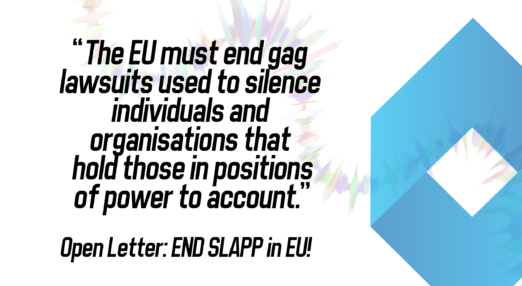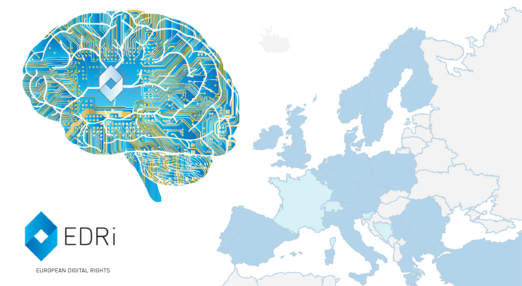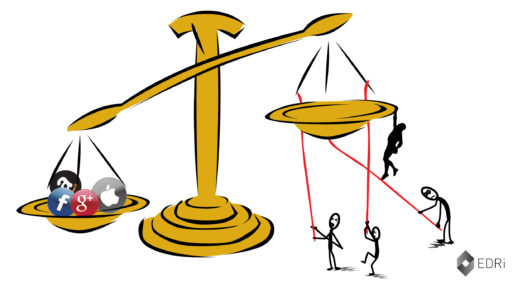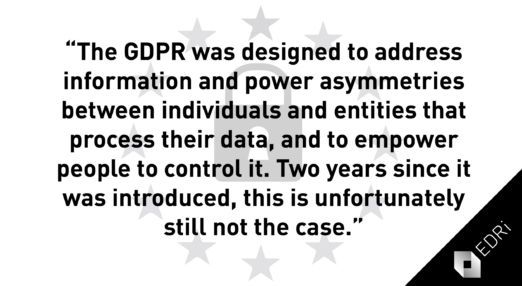Our work
EDRi is the biggest European network defending rights and freedoms online. We work to to challenge private and state actors who abuse their power to control or manipulate the public. We do so by advocating for robust and enforced laws, informing and mobilising people, promoting a healthy and accountable technology market, and building a movement of organisations and individuals committed to digital rights and freedoms in a connected world.
Filter resources
-

COVID-Tech: the sinister consequences of immunity passports
In EDRi’s series on COVID-19, COVIDTech, we explore the critical principles for protecting fundamental rights while curtailing the spread of the virus, as outlined in the EDRi network’s statement on the pandemic.
Read more
-

Open Letter: ending gag lawsuits in Europe – protecting democracy and fundamental rights
The European Digital Rights network joined 118 civil society organisations from across the globe in signing an open letter (the latest act of a longstanding movement) addressing the need to end gag lawsuits that threaten the public interest by allowing powerful actors to silence those that would speak against them.
Read more
-

EDRi submits response to the European Commission AI consultation – will you?
Today, 4th June 2020, European Digital Rights (EDRi) submitted its response to the European Commission’s public consultation on artificial intelligence (AI). In addition, EDRi released its recommendations for a fundamental rights-based Artificial Intelligence Regulation.
Read more
-

Can the EU make AI “trustworthy”? No – but they can make it just
European Digital Rights (EDRi) submitted its answer to the European Commission’s consultation on the AI White Paper.
Read more
-

EDRi-gram 18.10, 27 May 2020
"A collective vision of privacy means contesting ramped-up police monitoring and the use of marginalised groups as guinea pigs for new digital technologies, as well as ensuring new technologies have adequate privacy protections."
Read more
-

COVID-Tech: Surveillance is a pre-existing condition
In EDRi’s series on COVID-19, COVIDTech, we will explore the critical principles for protecting fundamental rights while curtailing the spread of the virus, as outlined in the EDRi network’s statement on the virus.
Read more
-

France: First victory against police drones
Since the beginning of the COVID-19 crisis, French police has been using drones to watch people and make sure they respect the lockdown. Drones had been used before by the police for the surveillance of protests, but the COVID-19 crisis represented a change of scale.
Read more
-

More than the sum of our parts: a strategy for the EDRi Network
It took over a year. From an EDRi members’ survey in early 2019 to the vote by the (online) General Assembly of members at the end of April 2020. In those months we held workshops, webinars, calls, several rounds of comments, draft iterations and about 50 consultations.
Read more
-

Competition law: Big Tech mergers, a dominance tool
This is the third article in a series dealing with competition law and Big Tech. The aim of the series is to look at what competition law has achieved when it comes to protecting our digital rights, where it has failed to deliver on its promises, and how to remedy this.
Read more
-

German Constitutional Court stops mass surveillance abroad
The German Federal Intelligence Service (BND) has so far been able to spy on foreign citizens abroad en masse and without cause—even on sensitive groups such as journalists.
Read more
-

Hungary: “Opinion police” regulate Facebook commentaries
There have been a number of critical news reports from around the world stating that Hungary’s COVID-19 state-of-emergency legislation is “creating a chilling effect”. Such headlines miss the mark somewhat, as chilling effects are far from new.
Read more
-

Open Letter: EDRi urges enforcement and actions for the 2 year anniversary of the GDPR
On 25 May 2020, for the General Data Protection Regulation (GDPR) 2 year anniversary, EDRi sent a letter to Executive Vice-President Jourová and Commissioner Reynders to highlight and urge action to the tackle the GDPR’s vast enforcement gap.
Read more
